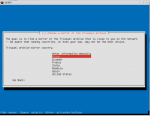Adding Ubuntu Repositories to Trisquel Temporarily
- Inicie sesión o regístrese para enviar comentarios
I would like to know how to and if it is possible to temporarily adding Ubuntu repositories and then installing software from them can break or crash my system or not. As far as I know, Trisquel mainly uses the Ubuntu repositories anyway, just removing the packages that are not 100% free. I would like to know if, to add repositories in Trisquel, I would I just need to edit /etc/apt/sources.list and add (assuming an Ubuntu 14.04 base)
deb http://archive.ubuntu.com/ubuntu trusty universe multiverse
deb http://us.archive.ubuntu.com/ubuntu/ trusty universe
deb http://us.archive.ubuntu.com/ubuntu/ trusty-updates universe
deb http://us.archive.ubuntu.com/ubuntu/ trusty multiverse
deb http://us.archive.ubuntu.com/ubuntu/ trusty-updates multiverse
deb http://security.ubuntu.com/ubuntu trusty-security universe
deb http://security.ubuntu.com/ubuntu trusty-security multiverse
Basically once I installed that software, I would want to remove the listings to the Ubuntu repositories, and mainly just use the Trisquel ones. You might ask if I wanted to do this why wouldn't I just use Ubuntu in the first place, but there are a few reasons that I would like to do this. A few of my reasons are:
1. I find Trisquel interesting. I want to try out a system using the Linux-libre kernel
2. I live in Mainland China. Living in Mainland China can make downloading things from foreign websites sometimes torturingly slow as a result of the Great Firewall of China. Ubuntu has repositories within Mainland China which can make updating and installing software from those repositories significantly faster.
3. Also, I like that Trisquel Mini can be used well on computers with low end resources like netbooks.
So in conclusion, I would like to know how to add Ubuntu repositories to Trisquel temporarily. If this is possible without breaking my system, please let me know how to do this.
Any and all help is appreciated with this.
Thanks
Ni hao Rocket,
I would not recommend it, but in theory it should be possible. Most Libre systems use scripts to remove the non-free software and documentation, would be alot of work to do this program by program.
Ruben, perhaps Trisquel could offer a mirror in Hong Kong or Taiwan?
I'd recommend installing the software from source or DEB files instead.
If it's possible, you could also use Tor/Proxychains/VPN.
i recently tried installing trisquel with the netinstall cd
and i noticed there was a Chinese mirror
these mirrors are hosted in china and should work
deb http://cn.archive.trisquel.info/trisquel/ belenos main
deb-src http://cn.archive.trisquel.info/trisquel/ belenos main
deb http://cn.archive.trisquel.info/trisquel/ belenos-security main
deb-src http://cn.archive.trisquel.info/trisquel/ belenos-security main
heres a list of all the diffrent mirrors:
http://cn.archive.trisquel.info/trisquel/README.html

Excellent discovery TomLuke...I never noticed the Chinese mirrors before! That should be all he needs.
The "multiverse" section only contains proprietary software! Don't do that: you would give up your own freedoms!
restricted is another section as well.
To clarify, you're wrong to assume that Trisquel uses the Ubuntu repositories. Trisquel has its own repositories, though the software in them is from Ubuntu's repositories (compiled from source, not just copying the binaries; and in many cases with custom patches applied).
Are you sure about that? I think that only the patched packages are rebuilt from source. The other packages are copied, unchanged, from the Ubuntu repositories. This was the main argument of the prism-break guys for excluding Trisquel from their list of recommended distros (they don't trust Canonical, which I find silly).
This is true. If you look at the checksums of unpatched packages, they are the same as those in Ubuntu.
For example,
http://packages.ubuntu.com/trusty/amd64/python3-minimal/download and http://packages.trisquel.info/belenos/amd64/python3-minimal/download (scroll to the bottom for checksums)
This package includes a build date and time (just run python and you'll see it) so different builds should be different.
- Inicie sesión o regístrese para enviar comentarios

